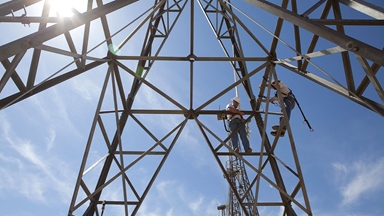Loading component...
At a glance
By Gary Anders
Governments and corporations around the world are focusing on achieving “just transitions” as they work on reducing global carbon emissions to meet net zero targets.
Just transitions are transitions that aim to achieve the best possible balance of environmental, social and governance (ESG) outcomes.
It's a delicate balancing act. The process of reducing emissions by shifting to environmentally sustainable solutions invariably demands major structural changes.
While these structural changes are needed to limit climate change, they may also have significant economic and social consequences.
“The transition towards net zero will affect, most acutely, those in workforces in sectors, cities and regions relying on carbon-intensive industries and production,” note the signatories to the Just Transition Framework outlined at the 26th United Nations Climate Change Conference of the Parties (COP26) in 2021.
“We recognise our role in working to ensure that no one is left behind in the transition to a net zero and climate resilient future. We recognise that all countries must benefit from the opportunities offered by sustainable and just transitions.”
COP26: Key outcomes for governments and businesses
Side effects of decarbonisation
The potential negative economic and social consequences of decarbonisation and transitioning to sustainable solutions are not necessarily confined to poorer nations.
Varya Davidson, energy transition leader at PwC Australia, says that energy transition is undoubtedly the biggest challenge facing Australia over the coming decades.
“Without a doubt, it is also the biggest opportunity, and that opportunity is social, environmental and economic.
“The energy transition really does offer us a rare chance to reshape the future of Australia’s labour market, building a bigger, better and more highly skilled workforce and genuinely improving the lives of Australians in all corners of the country,” Davidson says.
The transition also offers corporations a real opportunity to rebuild trust with stakeholders across their ecosystems, she adds.
“We really do believe putting people at the heart of the change can ensure an equitable transition that betters the lives of individuals, families and communities, as well as making our economy stronger,” Davidson says.
Patrick Viljoen CPA, senior manager ESG at CPA Australia, says that a just transition is about bringing everyone along on the transition journey.
“It’s one thing for us to talk about moving into a lower carbon state, how we’re going to be dependent on solar and how we’re going to be using all these mechanisms and technologies to drive Australia’s transition into a lower carbon state,” Viljoen says.
"The energy transition really does offer us a rare chance to reshape the future of Australia’s labour market, building a bigger, better and more highly skilled workforce and genuinely improving the lives of Australians in all corners of the country."
“The problem with that, which sometimes doesn’t get spoken about enough, is the resulting societal effects. What happens to workers in the mining industry, for example?
“If we are going to be shutting down coal mines, which is in line with reducing carbon emissions, how do we make sure those societies that are wholly dependent on coal production, and have been dependent on coal production for generations, are put into a position that they are upskilled sufficiently to transition into the new energy landscape that we are seeking?
Ultimately, the question is about how we safeguard livelihoods as we transition,” Viljoen says.
PwC Australia has estimated that the livelihoods of about 300,000 Australians could be affected by changes in the energy sector, with 10 local government areas accounting for one-third of all jobs in the sector.
“If we don’t manage the transition to net zero, that could lead to job losses in the fossil fuel industries and the businesses supporting those sectors, as well as broader economic decline of those regions supporting the industries or where there’s limited diversification at the moment,” says Viljoen.
The role of accountants
Viljoen says accountants will play an increasing role in advising organisations around their strategies and business models in terms of how they should be adjusted as they transition their operations.
“Once you get that right, and fundamentally you’ve changed the DNA of the organisation, the reporting slots in at the back of that, providing a mechanism to articulate an organisation’s sustainability journey.”
Davidson adds that lenders, advisers, insurers, brokers, investors and financial institutions are all poised to play a key role in the global transition to a net zero economy.
“They will influence and determine what’s going to get funded, when it gets funded, for how long and under what conditions, and you can already see the impacts playing out of the shift in expectation of financial players when it comes to access to debt and access to equity.
“Accounting firms will play a new critical role by helping to build trust in both financial and non-financial data,” Davidson says.
“You will see the role of the CFO extending to non-financial data as well as financial data, and accountants will play an important role in supporting that shift.”

